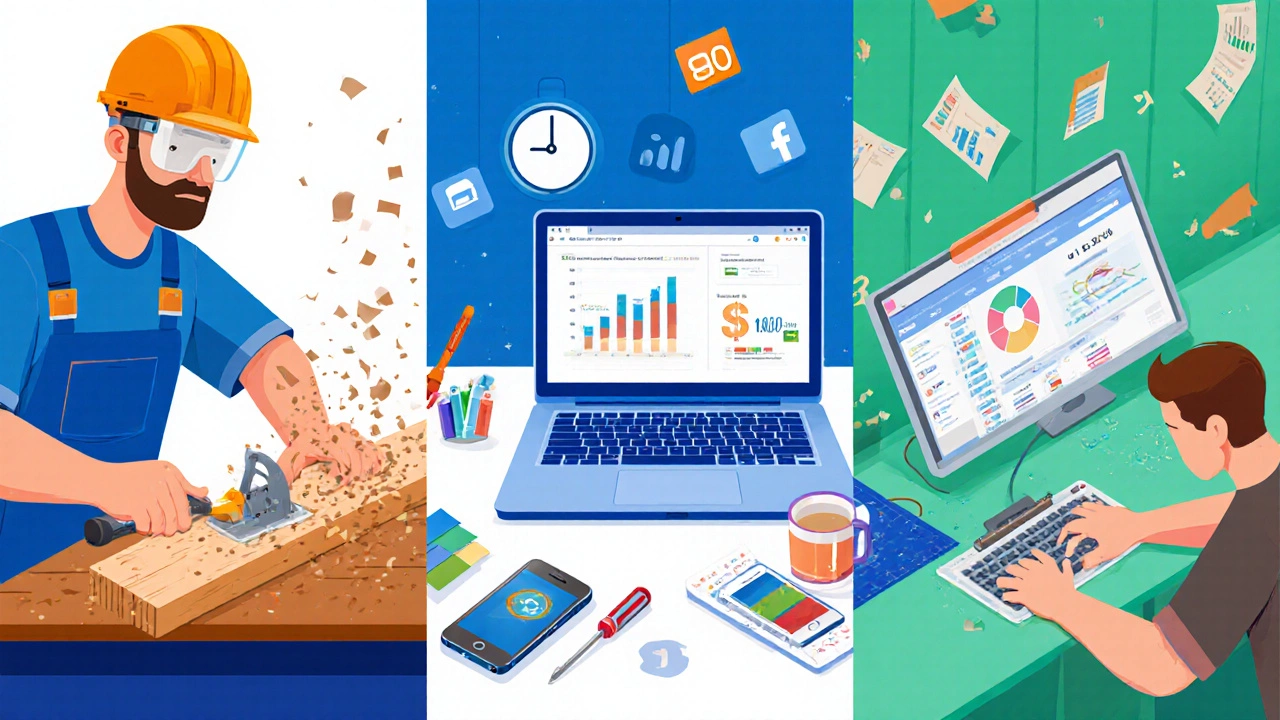Fast Trade Selector
Select Your Preferred Trades
Carpentry
4 weeks • $800-1200/month
Digital Marketing
3 weeks • $900-1500/month
Phone Repair
4 weeks • $750-1100/month
Graphic Design
4 weeks • $850-1300/month
Data Entry
2 weeks • $600-900/month
Select your preferences and click "Find My Best Fast Trade" to see recommendations.
Fast Trade Comparison
| Trade | Learning Duration | Earnings (Monthly) | Entry Barriers | Demand Growth (2024-2029) |
|---|---|---|---|---|
| Carpentry | 4 weeks | $800-$1,200 | Basic tools, safety gear | 4% CAGR |
| Digital Marketing | 3 weeks | $900-$1,500 | Internet access, laptop | 9% CAGR |
| Mobile Phone Repair | 4 weeks | $750-$1,100 | Screwdrivers, anti-static mat | 6% CAGR |
| Graphic Design | 4 weeks | $850-$1,300 | Design software | 7% CAGR |
| Data Entry | 2 weeks | $600-$900 | Computer, typing skills | 3% CAGR |
Quick Trade is a short‑term skill that can be picked up in weeks and starts generating income quickly. If you’re hunting for a quick trade to learn, you’ve come to the right place. In this guide we’ll break down the fastest trades, how to pick the one that fits you, and the exact steps to get earning in under a month.
Why Speed Matters in Today’s Job Market
Many people think a new career means years of study, but the gig economy and hyper‑specialised niches have created pockets where a few weeks of focused training can land you a paying gig. Faster entry means lower opportunity cost, less debt, and the ability to test multiple paths before settling on a lifelong vocation.
Top 5 Fastest Trades You Can Master in Weeks
-
Carpentry is a hands‑on trade that teaches you to build, repair, and finish wooden structures. A basic 4‑week apprenticeship covers measuring, cutting, joining, and finishing, letting you take on small‑scale jobs like furniture repair or custom shelving.
-
Digital Marketing focuses on driving traffic and sales online. In a 3‑week bootcamp you learn SEO basics, social‑media ad setup, and email campaign creation-skills that freelance agencies or small businesses need immediately.
-
Mobile Phone Repair teaches you to diagnose and fix common smartphone issues-screen replacement, battery swaps, and software glitches. Twelve hands‑on sessions get you certified to work at repair kiosks or start a home‑based service.
-
Graphic Design equips you with visual communication basics using tools like Canva or Adobe Photoshop. A 4‑week project‑driven course lets you build a portfolio of logos, social posts, and simple marketing assets.
-
Data Entry is an office‑centric skill where accuracy and speed are prized. A short 2‑week online module covers spreadsheet shortcuts, data‑validation rules, and basic database entry, opening doors to remote administrative roles.

How to Choose the Right Fast Trade for You
Not every quick trade fits every personality. Use these three criteria to narrow down your choice:
- Physical vs. Digital Preference: If you enjoy working with your hands, carpentry or phone repair may be more satisfying. If you prefer screen time, digital marketing or graphic design could be a better fit.
- Local Demand: Check job boards, local classifieds, and community groups. A city with many small cafés may need a carpenter for furniture tweaks, while a tech‑savvy town could have high demand for mobile repairs.
- Earning Timeline: Some trades, like data entry, start paying from day one of a contract. Others, like graphic design, may require a small portfolio before clients bite.
Step‑by‑Step Roadmap to Start Any Quick Trade
- Research the Trade: Watch 3‑5 YouTube tutorials, read a beginner’s guide, and note the core tools you’ll need.
- Enroll in a Short Course: Choose a reputable platform (e.g., Coursera, Udemy, local vocational institute). Look for courses that guarantee a certificate and include hands‑on practice.
- Gather Tools: For carpentry, buy a basic set of chisels, a hand saw, and safety gear. For digital marketing, set up a free Google Analytics account and a business Facebook page.
- Practice Real‑World Projects: Offer a free service to friends or a local non‑profit. Document the process; this becomes your first portfolio piece.
- Create a Simple Pitch: Draft a one‑page flyer or an online profile (LinkedIn, Fiverr) that lists your skill, rates, and a short testimonial.
- Start Taking Jobs: Reach out to local businesses, post on community boards, or bid on freelance platforms. Aim for 2‑3 small jobs in the first week to build momentum.
- Iterate and Upskill: After the first month, revisit the course material, add an advanced module, and raise your rates based on feedback.
Resources & Training Options
Here’s a quick list of platforms and local resources that specialize in fast‑track training:
- Skillshare: Short, project‑focused classes on graphic design and digital marketing.
- National Institute of Open Schooling (NIOS) - India: Offers 4‑week certificates in basic carpentry and electrician basics.
- iFixit Academy: Free modules on mobile phone repair with step‑by‑step visual guides.
- Local Community Centers: Many host weekend bootcamps for data entry and office software.
- Google Digital Garage: Free digital marketing fundamentals with a certification that looks good on resumes.

Common Pitfalls and How to Avoid Them
Even quick trades have traps. Spot them early:
- Skipping Hands‑On Practice: Theory alone won’t earn you money. Allocate at least 50% of your training time to real projects.
- Undervaluing Tools: Buying cheap, low‑quality equipment (e.g., a flimsy screwdriver set) leads to slower work and frustrated clients.
- Ignoring Local Regulations: Some trades, like electrical work, require a license. Verify the legal requirements in your state before taking paid jobs.
- Over‑Promising Rates: Start with modest pricing to build a track record; you can raise fees once you have testimonials.
- Neglecting Soft Skills: Communication, punctuality, and professionalism often decide repeat business more than technical skill.
Quick Comparison of the Fastest Trades
| Trade | Typical Learning Duration | Starting Monthly Earnings (USD) | Entry Barriers | Demand Growth (2024‑2029) |
|---|---|---|---|---|
| Carpentry | 4 weeks | $800‑$1,200 | Basic tools, safety gear | 4% CAGR |
| Digital Marketing | 3 weeks | $900‑$1,500 | Internet access, a laptop | 9% CAGR |
| Mobile Phone Repair | 4 weeks | $750‑$1,100 | Screwdrivers, anti‑static mat | 6% CAGR |
| Graphic Design | 4 weeks | $850‑$1,300 | Design software (free or paid) | 7% CAGR |
| Data Entry | 2 weeks | $600‑$900 | Computer, basic typing speed | 3% CAGR |
Frequently Asked Questions
Which quick trade offers the highest earning potential in the first three months?
Digital marketing typically yields the highest early earnings because businesses are willing to pay for immediate traffic boosts. A freelance marketer can secure $1,500‑$2,000 projects within the first quarter after building a simple portfolio.
Do I need a formal certificate to start earning as a carpenter?
A certificate isn’t mandatory for small‑scale jobs, but it adds credibility when bidding on larger contracts. Many community colleges offer a 4‑week certificate that costs under $200 and helps you command higher rates.
Can a complete beginner learn mobile phone repair in a month?
Yes. With a focused 12‑session program, a beginner can master screen replacements, battery swaps, and basic diagnostics on popular Android and iPhone models. Hands‑on practice is essential, so look for courses that include live repair labs.
How much should I charge for data entry work as a newcomer?
Start at $8‑$10 per hour to attract clients and build reviews. After completing 5‑10 projects with positive feedback, you can raise rates to $12‑$15 per hour, especially for specialized data‑migration tasks.
What are the legal requirements for starting an electric‑related trade?
In most Indian states, any work involving wiring or circuit installation requires a licensed electrician certificate from the state electricity board. For small repairs, a basic safety certification may suffice, but always verify local bylaws before advertising services.
